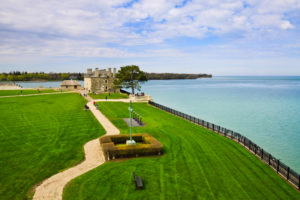
Hannah Schauer (1737-1797) was born in the Hudson Valley of New York in 1737 to our Palatine German ancestors, Johann Adam Schauer and Maria Fritz. At age 18, she married Jacob Sypes (1738-1777), also of German descent.
Jacob fought with the British Army during the French and Indian War of 1754-1763. This long war between England and France was fought in Europe, as well as North America, and left both nations deeply in debt (sound familiar?). As a result, both England and France began more aggressive taxation policies that helped precipitate, respectively, the American and French Revolutions.
Before the French and Indian War, France laid claim to all of Canada, and all of the Mississippi Valley west of Fort Duquesne, at the future site of Pittsburgh. In fact, the war started at Fort Duquesne when a Virginia militia unit under George Washington ambushed a French patrol near the fort. France ceded Canada to England in the Treaty of Paris of 1763, causing Voltaire famously to sniff that King Louis XV had merely “lost a few acres of snow” as a result.
During The American Revolution
Our ancestor, Hannah, was an ardent and courageous Loyalist during the American Revolution. Many German immigrants were deeply grateful to the British Crown for helping their families flee wars and persecution in Germany, and helping them become established in the American Colonies.
Hannah, Jacob and their family lived on and worked a successful farm in Bradford County, in northeastern Pennsylvania—an area that became increasingly hostile toward Loyalists. When the American Revolution broke out, the Sypes family was committed to fighting on the side of the British.
Unfortunately, Hannah’s husband, Jacob, the former British Army soldier, died in 1778. We do not yet know the circumstances of his death.
Traveling North
To protect her young family after Jacob’s death, Hannah fled to Canada from the Pennsylvania farm with her 9 children (3 sons and 6 daughters). Her youngest child, Hannah (Jr), was the next in our Bonner lineage. Hannah Jr. was just 6 years old when the family left Bradford County.
The long, perilous trek northward was a route followed by many Colonial Loyalists. The family spent many months traveling north through New York, hiding during the day and moving mainly at night in order to avoid Patriot patrols.
They first arrived in Quebec, then settled in a refugee camp on the island of Machiche (near Montreal) [the family is listed on the July 1779 Machiche census], and later to the west bank of the Niagara river in Ontario, where two of Hannah’s sons joined Butler’s Rangers.
Butler’s Rangers
In 1778 an American Loyalist, John Butler, organized a military unit comprised of colonial Loyalists called Butler’s Rangers. The Rangers fought with the British for the duration of the war, conducting raids in western New York and Pennsylvania. Many of the Rangers were of German descent.
With Hannah’s blessing and encouragement, her sons, Jacob Jr. and Andrew enlisted in Butler’s Rangers. Hannah’s uncle, Michael Schauer, also relocated with her to join the Rangers. Hannah and Michael were among the very first colonists to move to Canada because of Loyalist sentiments. Tens of thousands would follow in the years during and after the war, including our ancestor Benjamin Willson.
Hannah and her children all survived the war and remained in Ontario afterward, where they were awarded land grants to begin new lives.
Awarded Land Grants
The British government routinely awarded 200 acres of land to those who could prove they had contributed to the Loyalist cause during the American war – a wise strategy meant to populate Canada with people loyal to the Crown. Much of Ontario’s population in the early 19th century were descendants of American Loyalists. Hannah Sypes was one of the few women who were awarded land grants, receiving 200 acres in Bertie, Ontario for herself, and an additional 50 acres for each of her children (one square mile in all), in recognition of her support of her 2 sons fighting with the Rangers, and in recognition of her bravery in putting her family in harm’s way in support of the cause. Her land application of 1797 recounts her sons’ service with the Rangers, and further states that she had 6 daughters, all of whom were married and settled in Ontario.
Hannah Sypes is one of our family’s 2 qualifying ancestors for membership in the United Empire Loyalists Association of Canada, detailed in the Proof of Lineage link.
© 2013 W. Mullins
